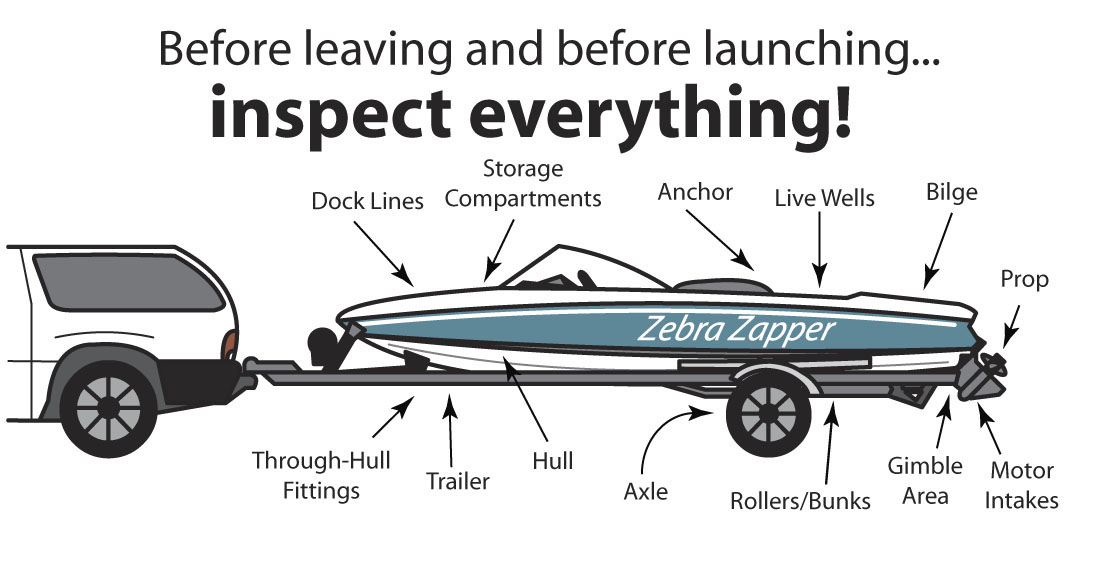(Courtesy of Michigan Department of Natural Resources)
If your leisure-time plans include boating or fishing, recent changes in Michigan’s Natural Resources and Environmental Protection Act (NREPA) may affect you. Beginning March 21, watercraft users in the state are required to take steps to prevent the spread of aquatic invasive species. Also, anyone fishing with live or cut bait or practicing catch-and-release fishing will need to take precautions to limit the movement of invasive species and fish diseases.
What boaters need to know
For boaters, amendments to Sec. 41325 of NREPA (Act 451 of 1994), finalized near the close of the 2018 legislative session, affect both motorized and nonmotorized watercraft, trailers and other conveyances used to move watercraft.
In addition to the existing law requiring all aquatic plants be removed from boats and trailers before launching, the changes require the following, prior to transporting any watercraft over land:
- Removing all drain plugs from bilges, ballast tanks, and live wells.
- Draining all water from any live wells and bilges.
- Ensuring the watercraft, trailer, and any conveyance used to transport the watercraft or trailer are free of aquatic organisms, including plants.
This means after trailering boats, and before getting on the road, boaters must pull plugs, drain water and remove plants and debris from all watercraft, trailers and other conveyances. A short video from the Michigan Department of Environmental Quality shows the steps boaters can take to comply with the new law.
What anglers need to know
For anglers, NREPA amendments codify the Michigan DNR’s Fisheries Order 245 regarding the release of baitfish, collection and use of baitfish and cut bait, and release of captured fish, specifically:
- A person shall not release baitfish in any waters of this state. A person who collects fish shall not use the fish as bait or cut bait except in the inland lake, stream, or Great Lake where the fish was caught, or in a connecting waterway of the inland lake, stream, or Great Lake where the fish was caught if the fish could freely move between the original location of capture and the location of release.
- A person, who catches fish other than baitfish in a lake, stream, Great Lake, or connecting waterway shall only release the fish in the lake, stream, or Great Lake where the fish was caught, or in a connecting waterway of the lake, stream, or Great Lake where the fish was caught if the fish could freely move between the original location of capture and the location of release.
Whether purchased or collected, unused baitfish should be disposed of on land or in the trash – never in the water. Any baitfish an angler collects may be used only in the waters where it was originally collected.
“It is important to clarify that anglers are allowed to catch and release fish,” said Seth Herbst, the DNR’s aquatic species and regulatory affairs manager. “Anglers who are catching and releasing fish should only release the fish back into the same water or in a connecting body of water the fish could have reached on its own.”
Why it matters
Here are some simple rules of thumb to help boaters and anglers navigate these laws:
- CLEAN boats, trailers and equipment.
- DRAIN live wells, bilges and all water – pull all drain plugs.
- DRY boats and equipment.
- DISPOSE of unwanted bait in the trash.
And remember when practicing catch-and-release fishing, return the fish to the water where it was caught.
For more information on the new boating and fishing laws, visit the Laws section at Michigan.gov/invasives.
Michigan’s Invasive Species Program is cooperatively implemented by the Michigan departments of Agriculture & Rural Development, Environmental Quality and Natural Resources.



Leave a Reply